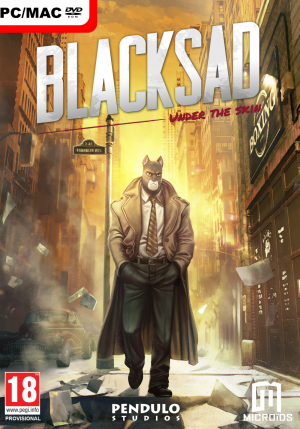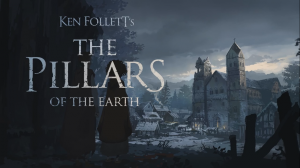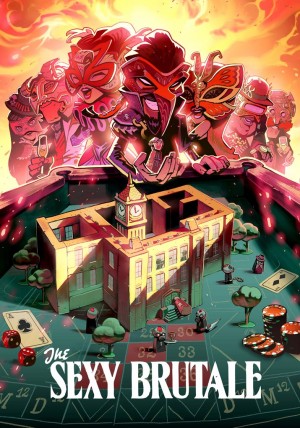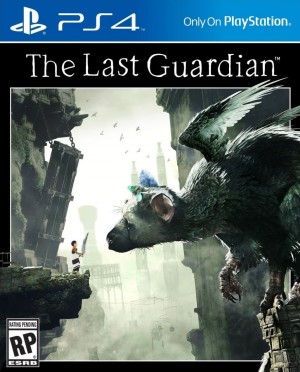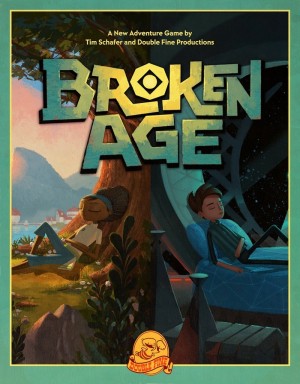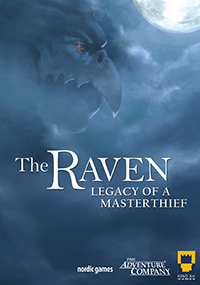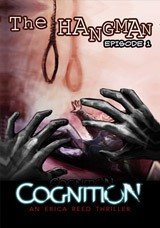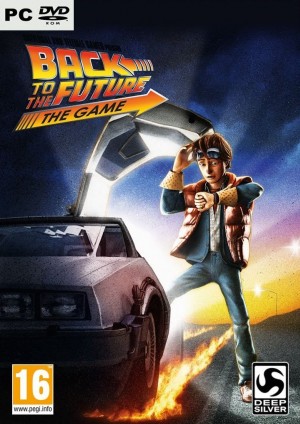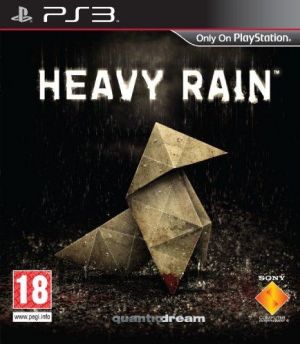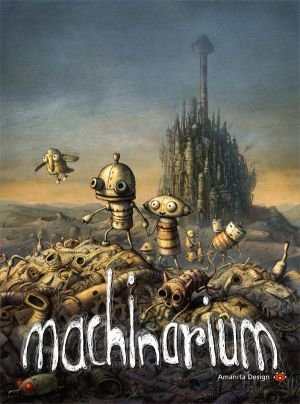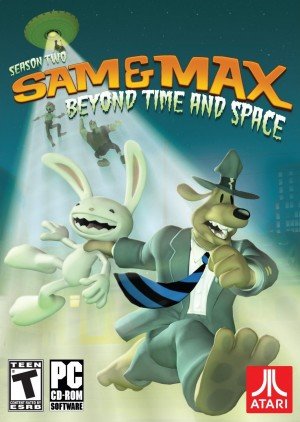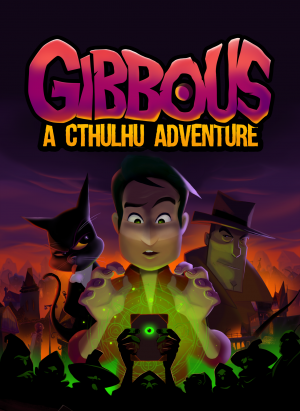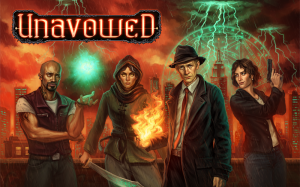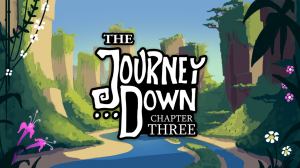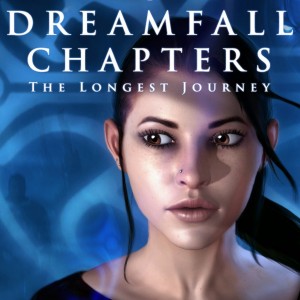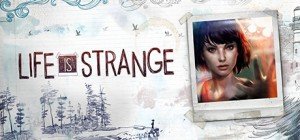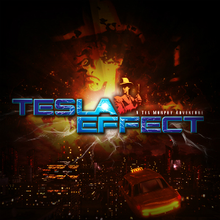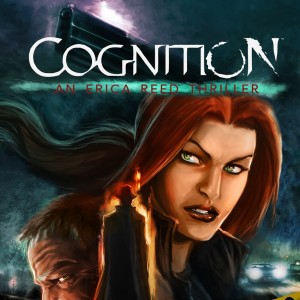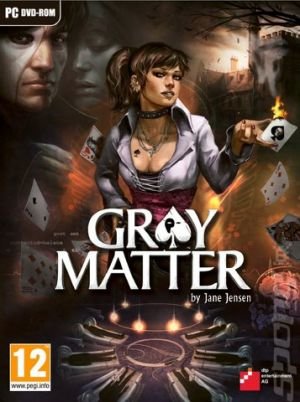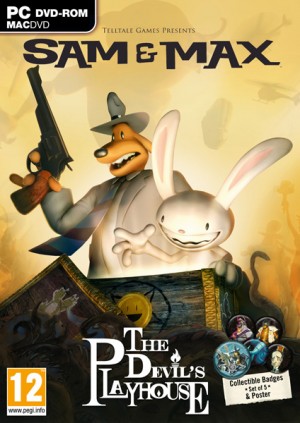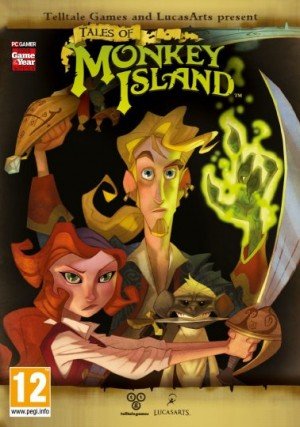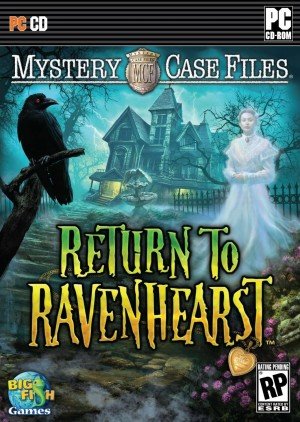Best MusicAggie Award Winners

As a complementary element playing in the background, often a game’s music is noticeable only when it becomes intrusive, but a strong score and attention to timing can add so much to the ambience. Dramatic escalations can heighten tension at just the right moments, while a catchy theme song can make a soundtrack truly memorable, and an in-game number even more so. Whatever its particular strengths, the game that excels musically deserves its accolades, even if its impact is subtle.
» Aggie Awards - category overview
The Aggie award winners:
Paradise Killer (2020 winner)
Kaizen Game Works’ debut title, Paradise Killer, impressed us with its anime-inspired visuals, brilliantly conceived world, and genuinely open-ended investigative gameplay, but what really helps set the mood for this outrageous sci-fi murder mystery is a soundtrack loaded with strong bass lines, funky guitars, soft trumpets and rad jazz solos, all mixed with a good dose of synths. It’s bound to make any player feel like a cool and sexy crime-solver – so much so, don’t be surprised to find yourself seeking out the 24-tune soundtrack after the fact to keep on grooving to the game’s delightful score.
The magnificent work of Barry “Epoch” Topping immediately leaves an impression with the main theme “Paradise (Stay Forever),” complemented by the powerful vocals of Fiona Lynch, perfectly setting the stage for the rest of the soundtrack to follow. The upbeat rhythms of the city pop genre go along nicely with the vivid vaporwave aesthetic of the not-so-idyllic Paradise Island. The chill sounds of lo-fi electronica mixed with jazz fusion have just the right amount of energy to liven up the investigation without ever being distracting. You perhaps won’t even realize just how deeply they’ve immersed you until they suddenly stop playing and a foreboding, ominous feeling sets in. You may need to be an “investigation freak” to solve the big mystery, but not to figure out why Paradise Killer deserves the Aggie Award for Best Music.
2020 winner of:
2020 Readers Choice' winner of:
- No awards won
Blacksad: Under the Skin (2019 winner)
Pendulo Studios and YS Interactive’s Blacksad: Under The Skin is one of those rare genre games that understands its subject matter's musical conventions and not only delivers, but goes above and beyond expectation. Juan Miguel Martin's jazz paints the scene beautifully and encompasses a wide range of expressions, from moody and suspenseful ("Before the Storm") to energetic ("The Daily Cut") to smooth and atmospheric ("Private Eye"). Martin uses his score judiciously and with a hand that is extremely attuned to the long and storied relationship between jazz and film noir. Likewise, Inon Zur's opening theme is a perfect encapsulation of orchestral noir: freely and unashamedly using frantic, swelling strings, block chords that fall like the blade of a guillotine, and a wailing chanteuse who seems to suffer from such overwhelming apprehension that she is bereft of words and reduced only to raw, husky vocalizations. Despite the many strong challengers, there isn’t a soundtrack more deserving of our Best Music Aggie than this.
2019 winner of:
2019 Readers Choice' winner of:
- No awards won
The Pillars of the Earth (Ken Follett’s) (2018 winner)
The Pillars of the Earth (Ken Follett’s)
Daedalic’s masterful adaptation of Ken Follett’s The Pillars of the Earth is an adventure suitably described as “epic” – and a game with such a towering story deserves an equally monumental soundtrack as a backdrop. Sparing no expense, Daedalic brought in the FILMharmonic Orchestra of Prague to provide an original composition, and listening to it while navigating the world of Shiring is truly a joy. The music is an unbroken, dynamic symphony that provides the gentle peace necessary during the quiet moments, but builds and crescendos at urgent points of decision. Whether exploring a town, communing serenely with a fellow monk, or trying to escape a deadly inferno, the score is always perfect for the circumstances.
This three-part historical adventure is a wonderful game that excels in many areas, but its standout achievement is how effective its soundtrack is throughout the entire experience. It’s not an accompishment of any individual song, but instead an ever-present framing of the sweeping dramatic narrative that hits all the right emotional beats. It’s consistently one of the most impressive things you’ll hear in a modern adventure, and certainly worthy of being recognized as the Best Music award winner for 2018.
2018 winner of:
2018 Readers Choice' winner of:
- No awards won
The Sexy Brutale (2017 winner)
The Sexy Brutale is a game where an unbelievably crazy number of things happen over the course of just a single day. Multiple melodramatic murders take place, a ghost dripping blood is the closest thing you have to an ally, and the whole experience is enveloped by a feeling of despair and melancholy. And yet this bizarre, time-looping stealth adventure manages to combine its menace with wild carousing at a masquerade party and the occasional bout of lighthearted silliness. Such a wide array of moods and moments puts an unusually heavy burden on the soundtrack to set the appropriate atmosphere. And boy, does this music deliver!
Right off the bat there’s an old-timey title theme that's so catchy it's hard not to delay starting the game for at least a few extra bars just to listen a little longer. Playing in the titular casino mansion's bar is a gentle, relaxing piano score that practically invites you to sit down for a drink. A ticking clock keeps the beat for eerie ambience at times, and every murder scene features gripping background accompaniment that builds in tension as the dastardly scene unfolds. From full instrumental jazz pieces to stirring operatic vocal performances, the soundtrack composed by Matt Bonham and Tim Cotterell never lets up on quality. With well over an hour of original music, the OST is one of the very few collections of video game tunes that is worth listening to even on its own (and not surprisingly, is available for purchase as a DLC extra), nudging The Sexy Brutale to the top of an excellent group of competitors for this year's Best Music Aggie Award.
2017 winner of:
2017 Readers Choice' winner of:
The Last Guardian (2016 winner)
It may seem strange at first that our Aggie Award for Best Music goes to a game that, for the majority of its play time, has no soundtrack whatsoever. But this conspicuous absence of music plays a large part in making it such a standout feature when it is present. There is no doubt that Takeshi Furukawa, The Last Guardian’s composer, has crafted an amazing orchestral score ranging from sweeping, majestic pieces to quiet, sorrowful dirges. But looping it throughout the puzzle and platforming sections would have been a mistake, lessening its impact when it is really needed most. Instead, we are treated to suitably thrilling scores during the nail-biting moments of danger and epic clashes, and pieces of soaring brilliance during times of celebration.
Where many games use music as filler to accompany gameplay, The Last Guardian’s compositions complement and enhance the story being told. Its timely arrival at well-chosen opportunities helps forge the bonds of friendship between the giant, lovable cat-bird Trico and the nameless protagonist (and, by extension, the player) that the whole experience revolves around. As impressive as it sounds on its own, the music works even better in context, as the thematic elements provide real stakes for the emotional score to play off. The final climactic thirty minutes produce an amazing roller coaster ride of fantastic, feature-quality tunes, without which the story’s emotional payoff would have felt incomplete. Without much in the way of verbal communication, The Last Guardian represents a master class in how to make music a vital part of building a relationship between characters.
2016 winner of:
2016 Readers Choice' winner of:
- No awards won
Broken Age (2015 winner)
It’s challenging enough to create a varied yet thematically-unified score for any video game, but this issue was multiplied by two for Double Fine’s Broken Age. The Tim Schafer-penned adventure has not just one but two protagonists, each inhabiting vastly different worlds from the other. Shay lives on a high-tech starship where his every need is catered to by a smothering computer system called “Mom,” while Vella resides with her family in the pastoral Sugar Bunting under the malevolent spectre of monster Mog Chothra. Various other settings are explored throughout the game as well, such as the cloud-city of Meriloft and the beachtown of Shellmound, each with its own completely distinctive backdrop. Yet composer Peter McConnell – acclaimed LucasArts alum and frequent Schafer collaborator – rose to the occasion magnificently, creating a soundtrack that not only captures the essence of each locale and the quirky characters who inhabit them, but also succeeding in musically intertwining the dual narrative structure.
With the occasional shift to jazzy numbers for mysterious moments, Shay’s sequences typically feature a child-like yet technologically-oriented feel: sounds reminiscent of a toy xylophone can be heard while perusing his bedroom, while a trip outside to the vastness of space is accompanied by distorted, electronic-sounding notes. Gameplay with Vella, however, tends toward mature-sounding tracks with an organic texture, mirroring the young heroine’s circumstances and mindset. Ethereal tunes accompany the action in rural Sugar Bunting, but marimbas play during scenes set in picturesque Shellmound. For both characters, the most cinematic or grandiose scenes are punctuated by sweeping orchestral scores. While the wonderfully varied music is a noteworthy accomplishment in its own right, performed by the Melbourne Symphony Orchestra and a group of San Francisco musicians, what elevates McConnell’s score to greatness is the way, especially later in the game, the tracks share instruments, moods, and themes, so that each tune is distinct yet retains a certain continuity when switching from one character to another. Such masterful attention to detail results in a soundtrack that perfectly complements one of the best adventures of the year, thus earning its place as 2015 Aggie Award winner for Best Music.
2015 winner of:
2015 Readers Choice' winner of:
The Journey Down: Chapter Two (2014 winner)
By far the most bittersweet acknowledgement for 2014 is our Best Music Aggie, awarded posthumously to The Journey Down’s primary composer Simon D’souza, who passed away after a battle with cancer during development of the game, and to Jamie Salisbury, who took over when Simon became too ill to wrap up production. But rest assured, this is no sympathy vote. This is Heath Ledger’s Joker – a standout accomplishment fully deserving on its own merit, made all the more tragic due to the fate that befell the artist.
The Journey Down: Chapter Two perfectly mixes the jazzy brass tones of Port Artue’s speakeasies and seedy back alleys with swelling orchestral pieces whenever the suspense ramps up – then reminds us it’s all in the service of good-natured, tongue-in-cheek fun, marrying its madcap on-screen hijinks with upbeat Caribbean flavour, sass and attitude. While the comedic elements of the series’ middle installment were dialed back a bit from its predecessor, its score remains as enchanting as it is unforgettable, and is clearly worthy of highest honors. But don’t just take our word for it: the soundtrack is available for purchase, with proceeds going to charity.
2014 winner of:
2014 Readers Choice' winner of:
- No awards won
The Raven: Legacy of a Master Thief (2013 winner)
The Raven: Legacy of a Master Thief
At times jaunty and carefree, other times sinister and foreboding, The Raven’s orchestral soundtrack will stick with you long after you’ve stopped playing. When you can still happily hum those trademark notes weeks and even months later, it’s a sign of something special. The opening track manages to set up the whole premise right away: as a friendly Swiss constable rides a train through a scenic mountainside, the accompanying melodic strings establish a whimsical feel that reflects his affable nature… until the horns build, signalling the danger that lurks ahead, both for him and the train’s precious cargo… but then the sweet violins return once again. Is everything really as it seems? Later on, refrains from this theme recur throughout the rest of the score, tying seemingly disparate music and narrative events together in unexpected ways in this three-part 1960s heist adventure from KING Art Games.
Music in The Raven accomplishes what any good soundtrack should: it immerses you into the action, subtly manipulating your emotions without ever drawing attention to itself. But when you do stop just to enjoy the music, it’s hard not to keep listening. It’s no surprise that the soundtrack is included separately, or that one of the game’s extra features shows the orchestra recording some of the songs. This is a score that has been skillfully composed and deftly integrated to encapsulate each significant on-screen moment. There’s a great variety to enjoy, as even individual tracks manage to build to tense crescendos before quickly drifting back to being light as a feather. It’s reminiscent of a great Hollywood score, harking back to the John Williams films of old. It’s simultaneously exciting, thrilling, mysterious and captivating. But above all, there’s such a strong sense of adventure. And in this genre, what more could you ask for? Well, you could ask that we give it the Best Music Aggie for 2013, so that’s exactly what we did!
2013 winner of:
2013 Readers Choice' winner of:
Cognition: An Erica Reed Thriller - Episode 1: The Hangman (2012 winner)
The first episode of Phoenix Online’s new episodic paranormal mystery Cognition is soaked with gloomy style. It is a game that has many different emotional gears: On the trail of a serial killer, Erica Reed finds herself performing a normal FBI investigation around the city of Boston, but she’ll also spend time in thoughtful conversations with a grieving family member at the cemetery, as well as experiencing very intense moments of jeopardy with an evil murderer close at hand. These narrative highs and lows would have had much more trouble resonating with players if they were not framed with an appropriately atmospheric soundtrack, but the brilliant score by Austin Haynes consistently hits just the right notes at all times.
Cognition’s music is soft and reflective when it needs to be, moody and ambient when circumstances dictate, and jarringly intense at the game’s darkest and most dramatic moments. During scenes when audio should be less prominent, the mood is kept light and unobtrusive, but the soundtrack is always a benefit to the events playing out on screen, which is a very impressive feat for an indie endeavour. The composer's work on The Silver Lining was notably one of that game’s strengths as well, and Phoenix Online clearly made the right choice by once again putting their music into his hands, as Cognition proved itself a deserving winner of our Best Music Aggie for 2012 over some very tough competition.
2012 winner of:
2012 Readers Choice' winner of:
Back to the Future: The Game (2011 winner)
When we consider the best composers for soundtracks, we usually think of movie greats like John Williams or game music virtuosos like Nobuo Uematsu and Michael Land; those who created iconic scores from scratch. Certainly Alan Silvestri’s original scores for the Back to the Future film trilogy are as memorable as they come. But it takes another kind of skill to take someone else’s work and expand on it while keeping true to the original spirit of the music, and that’s exactly what Jared Emerson-Johnson has done with Back to the Future: The Game. We’ll admit, we were hooked right from the familiar opening piano notes that giddily sent us straight back to 1985, but it takes more than that to carry a five-episode game series, and we were never disappointed right to the wonderful closing melody.
Silvestri’s original score triumphed because of its careful balance of whimsy, danger, melancholy, and awe. Rather than simply recycling the exact same tunes, Emerson-Johnson built on those popular themes over the course of each episode, taking them in new directions like the rigid, militaristic tones of Episode 3: Citizen Brown, while playing off just the right amount of nostalgia. This successful blend is a shared effort between the two composers, but of course it just wouldn’t be Back to the Future without some Huey Lewis and the News as well! Granted, our Best Music award for 2011 will resonate far more with existing fans of the franchise, but the superb soundtrack went a long way in making the game a worthy addition to the beloved series.
2011 winner of:
2011 Readers Choice' winner of:
- No awards won
Heavy Rain (2010 winner)
Hiding under a bed, you can hear the footsteps of a suspected killer grow closer as the soundtrack begins to stir and grow. Strained, tense musical movements heighten the tension and reach a crescendo when the creepy taxidermist discovers where you are hiding. Now shifting tone and tempo, the chase is on and the action becomes more frantic. As you panic and waste time, the strings get more and more erratic, punctuated by dark, overbearing woodwinds, and you can almost feel the sweat rolling down your forehead. Somehow you manage to escape, and both your character and the instruments let out a relieved sigh, the anxiety draining from the music as the pace slows again. Whew!
The score composed by Normand Corbeil to accompany Heavy Rain almost becomes a character of its own. Mirroring the mood and atmosphere of the in-game action perfectly, the music doesn't seem scripted but entirely organic. Rather than being cued by the action, it seems to be reacting naturally along with it, flowing seamlessly as players make different decisions that dictate the direction of the game. Several scenes use synthesized music where appropriate, such as a visit to a nightclub, but the bulk of the score is made up of grand orchestral, stirring pieces. It may not be particularly groundbreaking in its arrangement or style, but the fact that it resembles a perfectly assembled theatrical score – one which has the ability to change with each different playthrough – is an impressive feat that makes it the deserving Aggie winner of a very close vote for Best Music.
2010 winner of:
2010 Readers Choice' winner of:
Machinarium (2009 winner)
These production awards for Machinarium are starting to feel like a broken record, aren’t they? But this one sure doesn’t sound like one! This award provided some of the fiercest competition of all, but any soundtrack that warrants its own standalone music release must be something special. Sure enough, Tomas Dvorak’s soundtrack for Machinarium made the game sound every bit as great as it looks.
The music’s greatest achievement is the way it intuitively captures the feel of Machinarium’s distinctive style. The game itself melds grimy, industrial, almost post-apocalyptic scenery with lovable, anthropomorphic robots – think WALL-E through a surrealist filter. It makes sense, then, that the music is an eclectic hybrid as well: a relaxing mélange of minimalist electronic, glitch-pop, ambient, and even the odd bit of folk. It’s a loving compromise between airy charm and foreboding, mechanical electronic that is refreshing, unique, and the perfect accompaniment for the game’s robot hijinx.
2009 Readers Choice' winner of:
Sam & Max: Season Two (2008 winner)
Music in videogames is a quality that is hard to get right: it's often intrusive, endlessly repetitive, and rarely in keeping with what is happening on screen. That is not the case with Sam & Max: Season Two, which hits all the right notes (literally) for every possible situation. Just as he did in the first season, Jared Emerson-Johnson composed the soundtrack for the new episodes, and has once again delivered a variety of scores that fit each game like a glove. To name just two of many deserving examples, Moai Better Blues boasts a gorgeous, tropical-tinged soundtrack while Night of the Raving Dead’s zombie dance anthem and movie monster themes are highlights of the series.
It's an even greater testament to the high standard of game music when it can be appreciated outside the context of the games and still be just as enjoyable on its own terms, and it’s little wonder that Telltale has found a market for the soundtrack of this series all on its own. It’s simply that good. And just for extra measure, Season Two treats players to a smattering of in-game musical numbers that you’ll remember long after you’ve heard them... Musical numbers in games. How often do you hear those words spoken in the same sentence?
2008 winner of:
2008 Readers Choice' winner of:
Readers Choice' Award winners:
Chicken Police: Paint It RED! (2020 winner)
Chicken Police: Paint It RED!
Any good film noir story needs an appropriately moody soundtrack, and that goes double when it’s animal film noir. Fortunately, The Wild Gentlemen have imbued Chicken Police with a pitch-perfect brass and piano-driven jazz score to accompany brooding black-and-white visuals that will make you feel like you’ve just stepped back in time to the 1940s – a 1940s filled with a menagerie of anthropomorphic birds, mammals and reptiles, mind you. And like any classic hardboiled gumshoe mystery, it even stops in at the ritzy local nightclub, where the sexy feline songstress and femme fatale is performing live on stage. Not only do the twenty musical tracks provide top-notch accompaniment to the tale of Marty MacChicken and Sonny Featherland, the standalone soundtrack is great for just chilling when you’re done. This reader Aggie is merely the feather in its cap.
Gibbous: A Cthulhu Adventure (2019 winner)
Not just a pretty face, Gibbous sounds as good as it looks (at least, aside from Kitteh’s cringe-inducing solo vocals). Composed by Cami Cuibus and Liviu Boar, the music offers a surprising range of rich instrumentals from subtle to playful to eerily ominous depending on the circumstance, sometimes even changing abruptly when appropriate. Although completely original, the soundtrack’s inspirations can be felt throughout. At separate times you’ll feel like you’re in a Vincent Price or Humphrey Bogart film, while elsewhere there’s a vaguely Danny Elfman-like vibe. The developer’s Eastern European origins are also keenly felt, and for bringing together such an eclectic mix of tracks, Stuck In Attic scores another reader Aggie.
Unavowed (2018 winner)
Sure it LOOKS good, but how does Unavowed SOUND? Well, if the reader Aggie for best music is any indication, possibly even better. Thomas Regin’s score continually evokes the reality of New York City: jazz from the clubs and bars is blithely danceable or wistfully moody, while mystic strings atop hollow gong-like vibrations complement Asian ethnic neighbourhoods. This contrasts with the game’s suspenseful fantasy, where brutal conflicts are backed by pulsing orchestral music and ghostly manifestations are embellished by eerie electronic tones and whistle-like reverberations. It’s an atmospheric delight that never overshadows the characters when then talk, which is a good thing because Wadjet Eye may just have something to say about that award as well…
The Journey Down: Chapter Three (2017 winner)
SkyGoblin’s The Journey Down is no stranger to the Best Music podium, having earned AG staff honours for its second installment back in 2014. Sadly, the series’ original composer Simon D’souza is no longer with us, but the quality of the music under Jamie Salisbury is every bit as good. The score is remarkably diverse, including whimsical strings and a muted trumpet straight from a backwater speakeasy; creepy horns with slinking, reptilian percussion; luscious flutes backed by marimba-like rhythms; a jazzy tune with a snappy beat that’s almost impossible not to dance to; and monumental orchestrations that would fit right into an Indiana Jones movie. For sending this lovely point-and-click trilogy out on a high note (pun fully intended), the finale earns our readers’ highest musical acclaim this year.
Dreamfall Chapters (2016 winner)
You won’t find yourself humming to Dreamfall Chapters’ soundtrack, because it’s not that kind of game. There are no catchy, toe-tapping numbers here! But Simon Poole, who’s no stranger to the Dreamfall universe having worked on the previous game at Funcom, has composed a lovely instrumental soundtrack that provides a rich aural backdrop to the action. A piano gently plays in a comatose Zoë’s hospital room, while eerie, slightly discordant strings offer a haunting introduction to Storytime, exotic woodwinds and drums back the Azadi, and a minstrel-like melody accompanies your travels in the magical Arcadia. It’s a truly eclectic collection of tracks, each one tailored specifically to suit its particular setting and mood. It’s often so subtle you need to purposely stop and listen, but apparently many of you did. Score one for Dreamfall Chapters!
Life Is Strange (2015 winner)
Where most games (at least, the better ones) rely on scores that play in the background, what makes Life Is Strange really stand out musically is the way in which it cleverly integrates an alternative rock soundtrack that sounds exactly like what Portland-area high schoolers would listen to. Max will pop in her earbuds for a cinematic bus ride through town set to song, while the massive Vortex Club party has its own DJ spinning for crowds of dancing kids. In helping to fully immerse us in the world of Arcadia Bay, the readers’ Best Music Aggie goes to an increasingly familiar recipient.
Tesla Effect: A Tex Murphy Adventure (2014 winner)
Tesla Effect: A Tex Murphy Adventure
Some readers were shocked that Tesla Effect didn’t even make our finals (one of several painful omissions for us), and they’ve put their ballots where their mouths were, along with a whole heap of others. And not without reason. In keeping with its filmic approach, the music in Tesla Effect is often sparked by cinematic events rather than supplying atmosphere for each location. Composed by Bobby James, it ranges from an orchestral introduction full of yearning and bravado, to a lonesome bugle call rising amid the rubble of Chandler Avenue, to the growling, rumbling instrumental accompaniment when Tex learns his ultimate fate. The score never overpowers the action, sometimes raising tension with a creative mix of odd rhythms, dissonance, and resonating electronic tones. Two endings even feature special tracks, including a wonderful riff on Spaghetti Westerns at the Petrified Forest Bar-B-Q. Score another reader Aggie for Tex!
Cognition: An Erica Reed Thriller (2013 winner)
We can hardly disagree with your selection for Best Music, since we made the same choice ourselves last year after the initial Cognition episode. Between the wonderful score composed by Austin Haynes and the haunting closing credits song by Erica Reed voice actor Raleigh Holmes, the soundtrack is a superb musical complement to a powerfully dramatic story, and a deserving award winner any year.
Cognition: An Erica Reed Thriller - Episode 1: The Hangman (2012 winner)
If you've never played The Silver Lining, you may not be familiar with the work of Austin Haynes. But even if you have, it was no sure thing that Haynes could jump from the fantastical adventures in Daventry to a dark, disturbing serial murder thriller. But the self-proclaimed "composer for the imagination" did just that with Cognition, delivering a top-notch score that evoked all the right moods at just the right times. We clearly all hope to hear more from him in future, in more ways than one
Gray Matter (2011 winner)
Sure hope there’s still room on Jane Jensen’s mantel, because hubby Robert Holmes is largely responsible for the reader award for best music in 2011, just barely edging out all four of the other finalists. The composer’s atmospheric soundtrack includes a wonderful mix of brooding instrumentals with haunting vocals by The Scarlet Furies, a band in which both Holmes and his daughter play.
Sam & Max: The Devil’s Playhouse (2010 winner)
Jared Emerson-Johnson one-upped himself with a soundtrack as epic and frenetic as The Devil’s Playhouse itself. For Sam & Max’s third season, the usual noir-influenced jazz is joined by a diverse smattering of other themes, from ancient Egyptian fanfare to turn-of-the-century ragtime to “wakka-chikka” jive straight out of a 1970s B-movie. The result is a game that’s every bit as fun to listen to as it is to play.
Tales of Monkey Island (2009 winner)
Tales of Monkey Island
For Tales of Monkey Island, the talents of John Marsden and some random guy off the street named Michael Land were brought in to helm the accompaniment. (Okay, so Land composed the music for many enduring LucasArts classics, but other than those.) Not surprisingly, the pair created a splendidly jaunty soundtrack that fit the whimsical settings perfectly and earned it the readers’ choice award. We’d argue harder for our staff selection, but we’ve got that darned MI theme song stuck in our heads now. Thanks a lot.
Mystery Case Files: Return to Ravenhearst (2008 winner)
So this is what happens when you hire a high quality, professional orchestra to perform the soundtrack for your game. Who knew? Well, apparently Big Fish Games knew, turning to the Deutsche Film Orchestra in Berlin for Mystery Case Files: Return to Ravenhearst, and gamers were listening, giving the casual adventuring hybrid the nod over Sam & Max: Season Two and A Vampyre Story.







